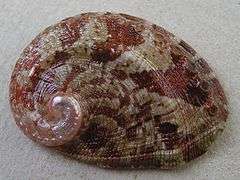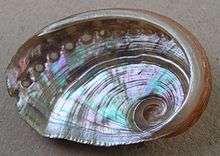Haliotis parva
Haliotis parva, common name the canaliculate abalone, is a species of sea snail, a marine gastropod mollusk in the family Haliotidae, the abalones.[2][3][4]
| Haliotis parva | |
|---|---|
 | |
| Dorsal view of a shell of Haliotis parva | |
 | |
| Ventral view of a shell of Haliotis parva | |
| Scientific classification | |
| Kingdom: | Animalia |
| Phylum: | Mollusca |
| Class: | Gastropoda |
| Clade: | Vetigastropoda |
| Superfamily: | Haliotoidea |
| Family: | Haliotidae |
| Genus: | Haliotis |
| Species: | H. parva |
| Binomial name | |
| Haliotis parva | |
| Synonyms[2] | |
Haliotis parva was among the first seven haliotids named by Linnaeus (together with Haliotis asinina, Haliotis marmorata, Haliotis midae, Haliotis striata, Haliotis tuberculata and Haliotis varia).
Description
The size of the shell varies between 25 mm and 50 mm. "The rather small shell is oval and depressed. It has a strong rounded rib on the upper surface, parallel with the row of holes. The surface of the shell is all over covered with fine closer spiral threads and much finer radiating striae. The form varies from elliptical to rounded-oval. The spiral rib of the upper surface is also variable in prominence. There are no radiating lamellae between the spire and the rib, and as usual there is a shallow channel outside of the row of holes. The color is between scarlet and brick-red, with irregular, often radiating white patches. The spire is raised and rather prominent. The inner surface is silvery, with red and green reflections. It has a furrow corresponding to the rib of the outside. The columellar shelf is narrow and flattened. The six perforations are subcircular and open."[5]
Distribution
This species occurs in the Atlantic Ocean from Southern Angola to South Africa.
References
- Linnaeus, C. (1758). Systema Naturae per regna tria naturae, secundum classes, ordines, genera, species, cum characteribus, differentiis, synonymis, locis. Editio decima, reformata. Laurentius Salvius: Holmiae. ii, 824 pp.. World Register of Marine Species, Retrieved 2013-02-02.
- Bouchet, P. (2012). Haliotis parva Linnaeus, 1758. Accessed through: World Register of Marine Species at http://www.marinespecies.org/aphia.php?p=taxdetails&id=207659 on 2013-02-02
- Geiger D.L. & Poppe G.T. (2000). A Conchological Iconography: The family Haliotidae. Conchbooks, Hackenheim Germany. 135pp 83pls.
- Geiger D.L. & Owen B. (2012) Abalone: Worldwide Haliotidae. Hackenheim: Conchbooks. viii + 361 pp. (29 February 2012)
- H.A. Pilsbry (1890) Manual of Conchology XII; Academy of Natural Sciences, Philadelphia, 1890
External links
- To Biodiversity Heritage Library (44 publications)
- To Encyclopedia of Life
- To GenBank (2 nucleotides; 2 proteins)
- To World Register of Marine Species
- "Haliotis (Haliotis) parva". Gastropods.com. Retrieved 16 January 2019.
| Wikimedia Commons has media related to Haliotis parva. |